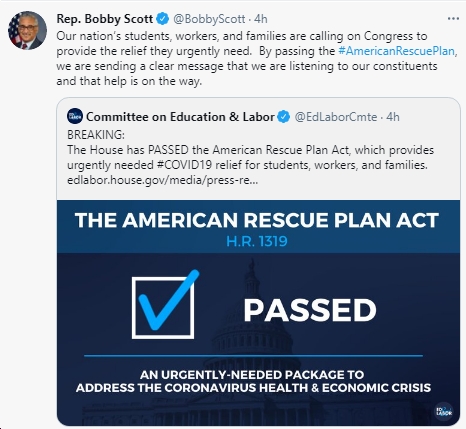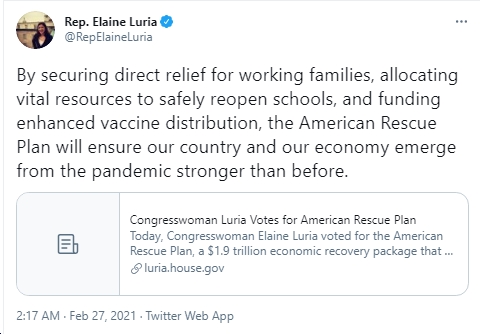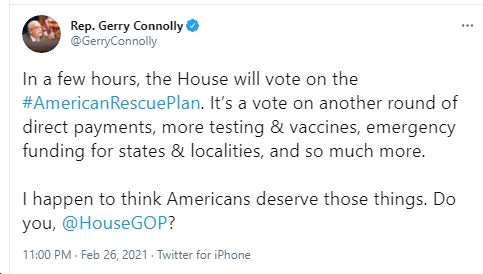See below for statements from Virginia U.S. House Democrats on the sweeping COVID relief package that passed late last night (no thanks to Republicans, of course).
Wexton Votes to Pass Sweeping COVID Relief Package
Washington, DC — Today, Congresswoman Jennifer Wexton (D-VA) voted to pass the American Rescue Plan Act to deliver urgent relief to families and small businesses who are hurting and fund the public health response to COVID-19.
“The American Rescue Plan will fund a robust public health response to get us through this pandemic and deliver immediate aid to help families and small businesses in need and ensure a strong economic recovery on the other side,” said Congresswoman Jennifer Wexton. “With this legislation, we will push forward with getting shots into the arms of every American, put money directly into the pockets of those who are hurting, ensure our kids can safely learn in their classrooms, and protect and restore jobs in our community. I will continue working with urgency to deliver the relief our district needs right now.”
The American Rescue Plan Act will fund a robust public health response to the pandemic, deliver immediate, direct relief to families and small businesses in need, and enable schools to expand their reopenings and remain open safely. The legislation includes:
Funding the Public Health Response:
- Over $20 billion for a coordinated national vaccination program to invest in the development and production of vaccines and get shots into the arms of Americans including through community vaccination centers and mobile units;
- $51 billion investment to expand testing, contact tracing, and mitigation activities, including $10 billion to boost Defense Production Act funding for manufacturing to meet public health needs;
- $50 billion for FEMA’s Disaster Relief Fund to reimburse states, localities, Tribes, and territories for ongoing COVID response and recovery activities;
- $4 billion to expand behavioral and mental health services;
- Support to hire 100,000 additional full-time employees in the public health workforce;
- Funding for state strike teams to help nursing home facilities manage COVID outbreaks;
- Providing states with the option to enroll uninsured individuals in Medicaid to receive free COVID testing, treatment, and vaccines, fully funded by the federal government;
Relief for Families and Small Businesses:
- Direct $1,400 payments to eligible Americans;
- Increased enhanced unemployment benefits from $300 to $400 a week and extension of the program through August 29, 2021;
- Raising wages for at least 27 million Americans by gradually increasing the minimum wage to $15 an hour by 2025;
- Relief for the hardest-hit small businesses, including:
- Expanded Paycheck Protection Program (PPP) eligibility and funding;
- $25 billion for a new Restaurant Revitalization Fund to provide assistance to small restaurants, bars, and craft beverage producers;
- $15 billion for the Targeted Economic Injury Disaster Loan (EIDL) Advance program;
- Historic expansions to tax credits for working families, including:
- Expanding the Child Tax Credit to $3,000 per child ($3,600 for children under 6), and making it fully refundable and advanceable;
- Enhancing the Earned Income Tax Credit for workers without children by nearly tripling the maximum credit and extending eligibility;
- Expanding the Child and Dependent Tax Credit (CDCTC) to allow families to claim up to half of their child care expenses;
- Expanded access to affordable health care by:
- Reducing premiums for low- and middle-income families by increasing the Affordable Care Act’s (ACA) premium tax credits for 2021 and 2022;
- Supporting the continuation of employer-based health coverage by subsidizing COBRA coverage through the end of the fiscal year;
- Creating health care subsidies for unemployed workers who are ineligible for COBRA;
- $39 billion for child care providers through the Child Care and Development Block Grant Program to rescue the industry from collapse and to provide financial relief for families;
- $26 billion for additional emergency rental and utility assistance programs plus $10 billion to help homeowners struggling to meet mortgage, property tax, utility, and other payments;
- Measures to address the surge in hunger during the pandemic, including:
- Continuing the 15% increase in SNAP benefits through September 30, 2021 and authorizing additional funding to meet the increased demand;
- Investing $5 billion to expand the Pandemic-EBT (P-EBT) program to help low-income families access food assistance both during the school year and summer months and $800 million for the WIC program to support low-income women and infants;
- $7.6 billion to help bridge the digital divide and support distance learning for students without a reliable internet connection;
- Addressing the rise in domestic violence during the pandemic with $450 million to support survivors, including funding for rape crisis centers and programs to support survivors of family violence;
- $13 billion for the Department of Veterans Affairs to provide health care services and other related supports for eligible veterans impacted by the pandemic, including suicide prevention, women’s health services, telehealth expansion, and medical facility improvements;
Aid to States, Localities, Schools, and Transit:
- $350 billion for states, localities, Tribes, and territories to keep first responders, frontline health workers, and other public service employees safely on the job and avoid devastating cuts to critical services;
- Nearly $130 billion to help schools meet Centers for Disease Control and Prevention (CDC) guidelines for safely returning students and teachers to the classroom and address lost learning time;
- Almost $40 billion for institutions of higher learning to help make up for lost revenue and fund emergency financial aid grants to prevent hunger, homelessness, and other hardships that students may be facing during the pandemic;
- $30 billion for transit systems to aid COVID response, particularly for payroll expenses and operating costs to maintain services safely;
- $8 billion in emergency aid for airports, with a requirement to continue to retain at least 90% of their workforce through the end of the fiscal year; and
- $15 billion to extend the Payroll Support Program through September 30, 2021 to prevent furloughs and layoffs of airline industry employees.
Virginia-10 Funding:
Under the legislation’s state and local funding, VA-10 is estimated to receive a total of $576.4 million and the Commonwealth of Virginia is estimated to receive nearly $3.8 billion. Under the plan’s school relief, the 10th District’s school systems are estimated to receive $333,957,000 with school systems across the commonwealth receiving nearly $2 billion total.
An updated breakdown of the estimated funding going to VA-10 counties, localities, and school districts can be found here.
If the American Rescue Plan Act is signed into law, it would reduce the poverty rate by 3.6%, below pre-pandemic levels, and lift nearly 12 million Americans out of poverty, as well as cut the child poverty rate in half.
More than half a million Americans have lost their lives to COVID. As the public health and economic crises continue, over 18 million Americans are receiving unemployment benefits, nearly 24 million Americans are going hungry with an estimated 12 million children living in households with food insecurity, up to 40 million Americans have struggled to pay rent during the pandemic and fear eviction, school closures threaten the education of countless millions of our children, and our most vulnerable communities are bearing the brunt of the crises as underlying health and economic inequities grow worse.
A section-by-section summary on the bill can be found here.
The full text of the bill can be found here.
****************************************
Spanberger Votes to Pass Emergency COVID-19 Relief Package, Deliver Additional Funding for Vaccinations & Small Business Assistance in Central Virginia
The American Rescue Plan Act includes Support for Improved COVID-19 Vaccination & Testing Efforts, Relief to Small Businesses & Restaurants, and Extended Unemployment & Rental Assistance
Congresswoman: “Tonight’s Vote is a Necessary Step to Come to the Immediate Aid of our Communities and to Prevent Lasting Damage to our Economy”
WASHINGTON, D.C. — U.S. Representative Abigail Spanberger tonight released the following statement after voting with a majority of the U.S. House of Representatives to pass additional emergency COVID-19-related assistance for Central Virginia families, healthcare providers, and businesses.
“Virginia is making notable progress against this deadly virus, and our healthcare workers are fighting around the clock to save lives — but our communities remain in the midst of a once-in-a-generation pandemic, and there is still so much at stake. In the coming weeks and months, strong and coordinated vaccination efforts are the key to reopening our businesses, getting our children fully back to school, and protecting the most vulnerable among us.
“This emergency package provides billions of dollars in additional funding for vaccines, so that we can accelerate our current battle against COVID-19. I’ve heard about the pressing need for this funding directly from local health officials in Virginia. This legislation also prevents critical programs — like unemployment insurance and rental assistance — from expiring next month, so that our Virginia neighbors who rely on these programs are not left without shelter or left to starve. Additionally, this package includes new funding to support small businesses and restaurants. Based on many personal conversations with these employers, I know the true pain they’ve felt over the past year — and I know many in Virginia are still in need of a helping hand to keep their employees on the payroll, their operations open, and their lifelong dreams alive.
“Tonight’s vote is a necessary step to come to the immediate aid of our communities and to prevent lasting damage to our economy. I will be closely following the Senate’s progress in the days ahead as Congress works to move this package quickly to the President’s desk. Inaction — or the refusal to compromise — is unacceptable in the face of this lingering crisis.”
BACKGROUND
The American Rescue Plan Act includes many priorities for Central Virginia — such as additional funding for COVID-19 vaccination and testing efforts, new loans for small businesses through the Paycheck Protection Program (PPP), extended unemployment insurance, continued rental assistance, and direct payments to individuals.
The American Rescue Plan Act contains several provisions to support Central Virginia communities, including:
- Strengthening funding for COVID-19 vaccinations and testing: The relief package includes billions of dollars in additional funding for COVID-19 vaccination and testing efforts — including more than $20 billion in additional funding to establish a national vaccination strategy to improve the administration and distribution of vaccinations in Virginia and across the country. Additionally, the legislation provides an extra $49 billion to expand testing, contact tracing, and distribution of personal protective equipment (PPE).
- Supporting Central Virginia small businesses through the Paycheck Protection Program (PPP) and new supports for restaurants and bars. The American Rescue Plan Act includes an additional $7.25 billion in PPP funding and would extend eligibility of nonprofits of all sizes and types — except for 501(c)4 lobbying organizations. Additionally, the emergency relief package would create a Restaurant Revitalization Fund through the U.S. Small Business Administration to provide $25 billion in assistance for restaurants and bars with fewer than 21 locations — with $5 billion set aside for smaller establishments that had less than $500,000 in 2019 annual revenue.
- Extending unemployment insurance: The American Rescue Plan Act would extend both the Pandemic Unemployment Assistance (PUA) program and the Pandemic Emergency Unemployment Compensation (PEUC) through August 29, 2021. Both programs are set to expire on March 14, 2021. Additionally, the legislation would extend the Federal Pandemic Unemployment Compensation (FPUC) through August 29, 2021 and increase the weekly supplemental benefit from the existing $300 per week to $400 per week.
- Providing emergency rental assistance to working families. The legislation would provide $21.2 billion for emergency rental and utility assistance to states, counties, and cities to ensure families can remain in their homes, stabilize renters, and protect rental property owners.
- Increasing the Child Tax Credit for Virginia parents. The American Rescue Plan Act would make the Child Tax Credit fully refundable for 2021 and increase the Child Tax Credit from $2,000 per child to $3,000 per child and make 17-year-olds qualifying children for the year. The legislation would direct the U.S. Secretary of the Treasury to issue advance payments of this tax credit, based on parents’ 2019 or 2020 tax returns.
- Delivering direct payments. The legislation includes additional direct payments for working families and individuals in Virginia. The American Rescue Plan Act would provide additional direct payments — or “stimulus checks” — of $1400. Under the bill as currently written, single filers with incomes up to $75,000, head of household filers with incomes up to $112,500, and joint filers with incomes up to $150,000 would receive the full payment of $1,400.
******************
Beyer Remarks During American Rescue Plan Floor Debate
February 26, 2021 (Washington, D.C.) – Rep. Don Beyer (D-VA), the expected incoming Chair of Congress’ Joint Economic Committee, delivered the following remarks on the House Floor this evening during debate on the American Rescue Plan Act:
“Madam Speaker, we have a choice tonight.
American children are hungry, the recovery is stalling, and a million new people file for unemployment every week.
We can do our jobs: pass a national vaccination plan, safely reopen our schools, send relief checks to those who need, support the unemployed, and protect American jobs.
Or we can let them fend for themselves, to slowly scratch their way back to health at great human cost.
I choose relief, recovery, and progress.
Madam Speaker my first job was in 1966 at $1.25 an hour – minimum wage.
16 times Congress has chosen to increase the minimum wage, and every time there was a CBO score or a Chamber of Commerce or a conservative economist who talked about ‘the shrinkage of low wage jobs.;
But if we’re persuaded by this job loss mirage, we would never raise the minimum wage. And I refuse to believe that this is American exceptionalism.”





![Sen. Tim Kaine on Appropriations Bills: “we shouldn’t give [Trump’s] deranged decisions the imprimatur of congressional approval by passing this legislation without significant amendment.”](https://bluevirginia.us/wp-content/uploads/2025/03/kaineblasts-238x178.jpg)
![Thursday News: “Europe draws red line on Greenland after a year of trying to pacify Trump”; “ICE Agent Kills Woman, DHS Tells Obvious, Insane Lies About It”; “Trump’s DOJ sued Virginia. Our attorney general surrendered”; “Political domino effect hits Alexandria as Sen. Ebbin [to resign] to join Spanberger administration”](https://bluevirginia.us/wp-content/uploads/2026/01/montage010826-238x178.jpg)





![[UPDATED 1/29/26] Audio: Sen. Tim Kaine Talks to Blue Virginia About His “Five-Point Plan” to Fight Trump’s Orban-Like Assault on US Democracy; Civil Disobedience a la MLK Jr.; Trump’s Bogus “Energy Emergency”; the Crucial Importance of the 2025 VA Elections; etc.](https://bluevirginia.us/wp-content/uploads/2025/02/kaineinterview2-100x75.jpg)

